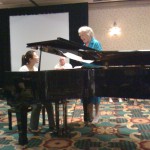PA Shorts: 10 Cent Words
 Differentiated Instruction was the topic of the article. Specifically how to do it effectively. (Students Matter: 3 Steps for Effective Differentiated Instruction) As I read the text, I realized that studio music teachers are masters of this art. Differentiated Instruction. 10 cent words for what has become second nature to most piano teachers.
Differentiated Instruction was the topic of the article. Specifically how to do it effectively. (Students Matter: 3 Steps for Effective Differentiated Instruction) As I read the text, I realized that studio music teachers are masters of this art. Differentiated Instruction. 10 cent words for what has become second nature to most piano teachers.
1. Know your students’ strengths.
“Effective differentiation starts with knowing the students’ academic strengths, interests, and perspectives.“ We know our students, their families, and how they like to learn. We know what sports they play, what pets they have, and where they spent their last vacation. In fact, sometimes we just want to yell, TMI! But, of course, we don’t. We know that the better we know a student the more effective we can be. As one of my teachers said, “You have to be 80% psychologist to be a good teacher.”
2. Involve students in the planning process.
What piano teacher hasn’t given a student several choices of repertoire that will help them move forward or provide a chance for them to play in new skills or concepts. Many of us allow students to choose all or some of the pieces for recitals, evaluations, masterclasses, etc. When students like what they are doing they practice harder and learn more deeply. So what if occasionally a student attempts something way above their current level? If they are ok with a long-term, open-ended project they will learn a lot in the process. What’s not ok by me is when that is the only piece they work on for the next year.
3. Leave ego outside the classroom.
Most of us are part of a huge network of teachers through social media, music teacher associations, conferences, and even this humble blog. We are always on the lookout for new ways to do things; from attractive, effective repertoire, to new ways to present concepts and skills, to studio management. We share our own ideas and pull other people’s ideas out of our toolboxes when we need to. We put students in Masterclasses and invite the rest of the studio to come watch and learn. When we are not the right fit for a student we send them off to a new teacher who can help them grow in music.
Of course, all this is much harder in a classroom situation than in a one on one studio situation—especially hard if you are teaching 6 sections of Math, English, or ??? a day. We are so lucky that we can be a part of our students’ lives. It is a privilege to know them as deeply as we do. Differentiated Instruction. Priceless words.


